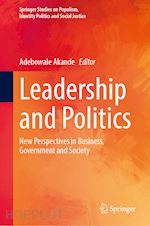
Questo prodotto usufruisce delle SPEDIZIONI GRATIS
selezionando l'opzione Corriere Veloce in fase di ordine.
Pagabile anche con Carta della cultura giovani e del merito, 18App Bonus Cultura e Carta del Docente
This volume sheds light on the world of organizational politics, political leadership, and the pivotal roles played by employees and political leaders in managing diverse groups. It picks up where influential scholars like Edgar Schein, Harry Triandis, Bernard Bass, Robert House, Shalom Schwartz, and Geert Hofstede left off, providing a timely and transparent exploration of these crucial topics.
In a rapidly evolving landscape, characterized by renewed interest in political skill, people management, leadership and management, diversity training, organizational culture, workplace incivility, ambivalence alliance, and career development, the book emerges as an invaluable resource, assembling a group of renowned contributors in the field, who have conducted extensive social research. It offers a comprehensive view of contemporary organizational politics, psychology at work, DEI, political skill/will, HRM, leadership effectiveness, organizational behavior and culture, relationships in the workplace and emotions in politics, favoritism, workplace incivility, ambivalent alliance, people analytics, and office politics, and competition.
The book discusses the ongoing struggle between knowledge-driven scholarship and dogmatic ideology in the workplace and beyond. As organizations grapple with the challenges of today's business environment, the book therefore is an indispensable guide for scholars, consultants, and leaders committed to driving continuous improvement and navigating the complex intersection of politics and leadership in the modern workplace.
Chapter 1. Introduction: The Ambiguity of Leadership and Politics.- Chapter 2. Machiavellian Leader Effectiveness: The Protective Role of Social Astuteness.- Chapter 3. An in-group Favoritism and Belonging in the Minimal Group Paradigm.- Chapter 4. Changes in the World of Work: An Austrian Investigation.- Chapter 5. Political Leaders and Relevant in-group Threat Can Determine Whether Negative Attitudes Toward Muslims and Jews Are Perceived as Relatively Truthful or Prejudiced: An on-line Experimental Analysis.- Chapter 6. Line of Sight: The Nature and Dynamics of Organizational Strategy’s Internal Dimensions.- Chapter 7. Unethical Pro-organizational Behavior and Flourishing: An Investigation of Why, How, and Under What Circumstances.- Chapter 8. Servant Leadership as an Enhancer of Sustainable Development and Customer’s Attitude to Sustainability in the Hospitality Industry.- Chapter 9. The Myth of Strategic Leadership.- Chapter 10. Dark Triad Personalities and Political Skill: Testand Amplification of Toxic Career Theory.- Chapter 11. Politics and Workplace: Social Identity, Collective Self-esteem, and Intergroup Discrimination.- Chapter 12. The Intersection of Race and Gender Within Leadership: Implications for Organizational Politics.- Chapter 13. Theorizing Favoritism.- Chapter 14. Prejudice Against Asians: The Role of Belonging as a Predictor and an Outcome of Intergroup Discrimination Against Asians in New Zealand.- Chapter 15. Emotion of Politics (Unity) Versus Politics of Emotions (Division): Black Panethnicity Among Native and Foreign-born Blacks.- Chapter 16. Violence in the Workplace.- Chapter 17. Leading Change by Leveraging Cultural Strength: When Religious Leaders Champion Gender Equity with Religion as a Strength.- Chapter 18. The Language of Political Violence in Northern Ireland.- Chapter 19. The Psychology of Populism: Tribal Challenges to Liberal Democracy.- Chapter 20. Democratic and Populist Leadership: Between Democracy and Autocracy.- Chapter 21. Recognising Leadership Potential: Looking Beyond Comparative Perspectives on Aid.- Chapter 22. A Controversial Cloak for Controversial Actions: The Unitary Executive Theory and Donald Trump’s Populist Presidency - - Personality, Politics, and Perceptions.- Chapter 23. Qualitative Research on Leadership and Politics: A Critical Theoretical Reappraisal.- Chapter 24. The Performance of Women Analysts in Earnings Call Conferences: A Textual Analysis.- Chapter 25. The Challenge of Artificial Intelligence in Marketing for Leaders: Understanding and Managing Ethical Risks.
Prof. Adebowale “Ad” Akande is an international social theorist and a major figure in global politics and social science. He has an H-index of 143/23 and has been cited numerous times in various articles on SCOPUS. With over 37,533 Google Scholar citations, he is among the top two percent and above the 93.9th percentile of the world's most influential social scientists. His collaborative works have been reprinted in anthologies and the Financial Times-50 list. He has held faculty appointments at several international universities and received numerous awards, including the UK Commonwealth Academic Fellowship, IUPSYS International Award, Frank Andrew Award, University of Michigan, Sesquicentennial Prize St Xavier University, Chicago, Marquis Who's Who in the World, Taiwan Government International Scholar Fellowship, Nippon Foundation of Japan Fellowship, and Fellow Schloss Leopoldskron in Austria. He is also a co-recipient of the Annual SIOP's Scott Myers Award, Division 52'sUrsula Gielen Global Book Award, the Gordon W. Allport Prize (2005), and APA Global Award for his research on ambivalent sexism, leadership research projects, and Cross-Cultural Family, which are Scientific Citations Classics. He was elected to the American Academy of Arts and Sciences in 2010 and currently serves as an international director for IR GLOBE in Vancouver and as a professor.











Il sito utilizza cookie ed altri strumenti di tracciamento che raccolgono informazioni dal dispositivo dell’utente. Oltre ai cookie tecnici ed analitici aggregati, strettamente necessari per il funzionamento di questo sito web, previo consenso dell’utente possono essere installati cookie di profilazione e marketing e cookie dei social media. Cliccando su “Accetto tutti i cookie” saranno attivate tutte le categorie di cookie. Per accettare solo deterninate categorie di cookie, cliccare invece su “Impostazioni cookie”. Chiudendo il banner o continuando a navigare saranno installati solo cookie tecnici. Per maggiori dettagli, consultare la Cookie Policy.